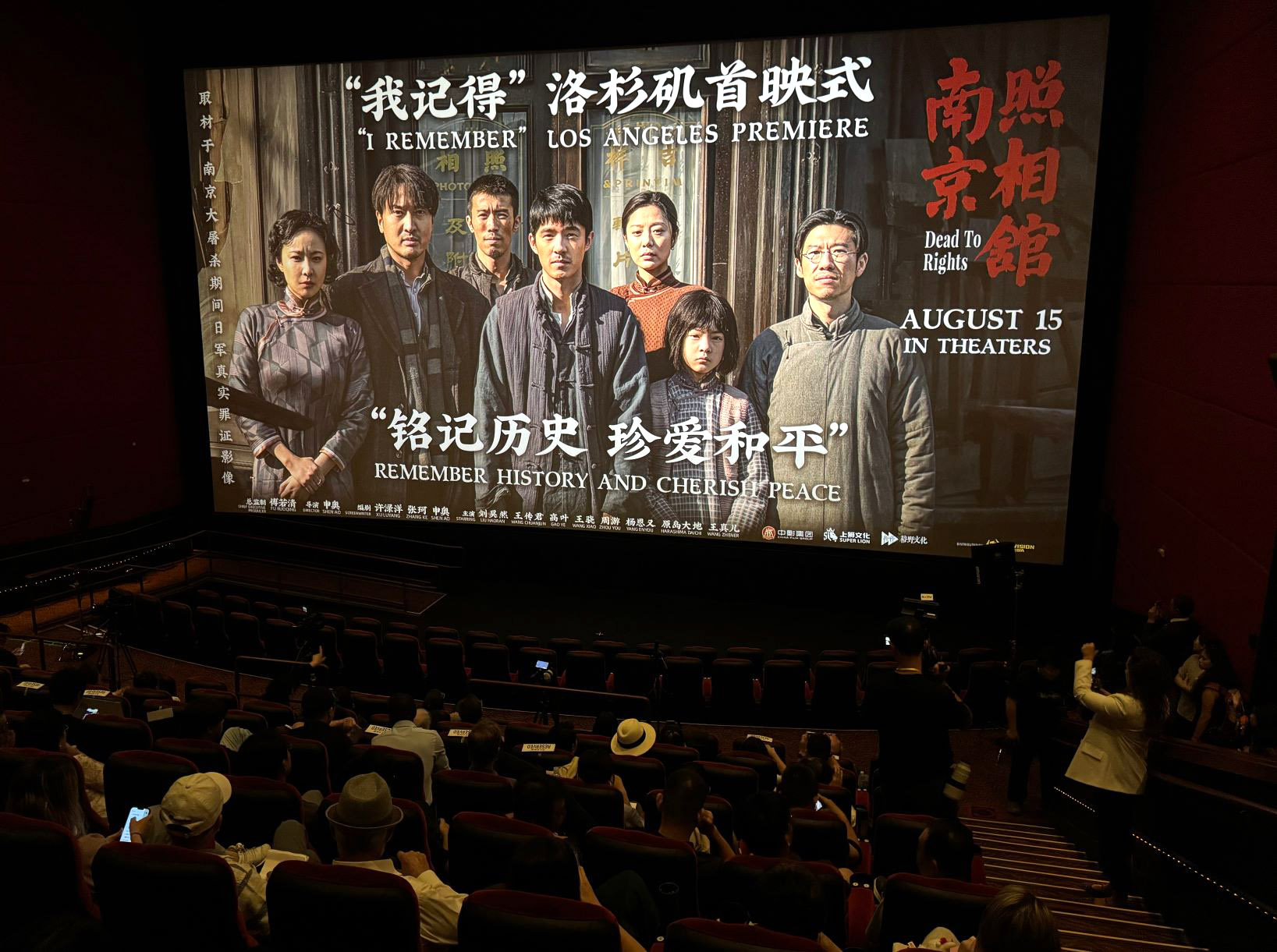
With the theme "Remember history, cherish peace", the Chinese historical movie Dead to Rights made its Los Angeles debut on Aug 11, drawing residents, artists, scholars and officials to an advance screening.
The premiere coincides with the 80th anniversary of the end of World War II and the victory in the Chinese People's War of Resistance Against Japanese Aggression (1931-45). Against this backdrop, the movie revisits one of the darkest chapters of that period — the Nanjing Massacre.
"This movie is about a lesson of history that the Chinese people suffered 88 years ago," said Huang Hongjiang, China's deputy consul general in Los Angeles.
READ MORE: 'Dead to Rights' smashes box office records, raises awareness
"You will also learn about the atrocities committed by Japanese aggressors, their aggression, occupation, oppression and militarism. I cannot find the words to fully describe it."
Set in 1937 in Nanjing, then the capital of the Republic of China, the movie follows a group of civilians taking shelter in a photography studio.
While struggling to survive, they assist a Japanese military photographer in developing film, only to uncover harrowing images of atrocities. Risking their lives, they preserve the negatives as evidence of Japanese war crimes.
The storyline draws from documented history, in particular the real-life Huadong Photo Studio in Nanjing, where apprentice Luo Jin uncovered and safeguarded photographic negatives that later served as key evidence at the Nanjing War Crimes Tribunal.
The Los Angeles premiere elicited strong emotions from the audience.
"It was a powerful film," said Henry Jenkins, a media scholar and professor at the University of Southern California. "It hits the human heartstrings and dramatizes a really serious piece of history that we do need to remember and reflect on."
Local resident and film lover Joseph Hampton praised the movie for making history relevant and immediate.
"It's a very important film because it's bringing a tragedy and a horror from the past that's too easy to see as distant history," Hampton said.
"By showing the people in the studio, their life stories, the sacrifices they made and the price they paid to preserve the photographs, it brings the events to life and forces you to confront them."
Extraordinary act
The civilians' choice to risk their lives to preserve the photographic evidence was portrayed as an extraordinary act that altered history, Hampton said.
"When we watch this in the United States, in France, anywhere, we have to think: Could we make such a decision? It's not easy, and the movie makes you confront that," he said, noting how the "beautiful, subtle piano music" contrasted with the violence, underscoring the enduring presence of humanity even amid horror.
From 1931 to 1945, Japan's aggression across China left an estimated 35 million civilians and soldiers dead. Among the worst atrocities was the Nanjing Massacre, which began in December 1937 and claimed the lives of more than 300,000 civilians and unarmed soldiers, while countless women were raped.
"This film shows there's a madness in people that, if unchecked, can grow into horrific atrocities," said Bob Underwood, a writer and producer. "It's important to recognize both the good and the bad from our past, so we can prevent history from repeating itself."
Veteran network correspondent Sean Callebs described the movie as a compelling portrayal of atrocities, drawing comparisons to Schindler's List.
"I really hope this film is screened not just in the United States but globally. Everybody should have the chance to see this history," Callebs said.
ALSO READ: War-themed movies teach important lessons
For actress Hope Inchiostro, the premiere was an introduction to a largely unknown history. "I had no idea before coming to this movie about the Nanjing Massacre," she said. "The film told a horrific story about humans behaving like monsters, very ugly, but it's important to know."
Studies have found that many young people in the West cannot name key battles, atrocities or even the major theaters of World War II — especially in Asia. In some countries, the Pacific War has all but vanished from school textbooks. In this context, Dead to Rights serves both as a historical reckoning and a timely warning about the dangers of forgetting.
Following its Aug 7 premieres in Australia and New Zealand, the movie was released in the US and Canada on Friday and will later reach global streaming platforms.
Contact the writer at renali@chinadailyusa.com


